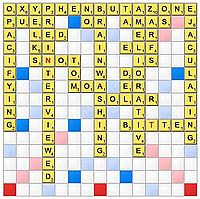I am currently playing four different Scrabble games at the same time against opponents from four different states. As if Facebook wasn’t addictive enough already! The online Scrabble game named Scrabulous is gaining in popularity. It has always been difficult for me to sit down for a Scrabble game against my good friend and Scrabble nemesis since he now lives in Chicago. And finding the time to play Scrabble against my ultra-competitive little brother is always a challenge. With Scrabulous I can play both of them… and at the same time.
 In my time playing Scrabulous I’ve learned that the Hebrew plural word aliyot is a valid word. Also, in the second edition of the Official Scrabble Players Dictionary the anglicized form aliyas was officially changed to aliyahs.
In my time playing Scrabulous I’ve learned that the Hebrew plural word aliyot is a valid word. Also, in the second edition of the Official Scrabble Players Dictionary the anglicized form aliyas was officially changed to aliyahs.
A Wall Street Journal article last week gave the background on the Facebook application and mentioned a potential copyright infringement by the two Indian brothers who created Scrabulous.
From “Networking Your Way to a Triple-Word Score: A Scrabble imitator becomes a Web addiction — with help from Facebook” by Jamin Brophy Warren (WSJ Online, October 13, 2007):
Since its Facebook debut in July, Scrabulous has grown to about 950,000 players. According to Facebook’s data, 36% of those players (about 342,000 people) are “daily active users,” or people who have logged in every day over the last 30 days. That’s compared with an average of 7% for the site’s top 50 tools and games, according to SocialMedia, a social-advertising company that tracks Facebook activity.
Those numbers reflect a critical decision by Jayant and Rajat Agarwalla, the brothers behind the game. Having drawn only a few thousand users to a Web site devoted to Scrabulous, they converted it to a Facebook “application” in June. An application is a module Facebook’s users can add to their pages and then invite their Facebook friends to join.
Rajat says that as of mid-September, the site’s revenue from advertisements displayed near the game board was sufficient to cover operating expenses. Now, the game brings in around $18,000 a month from selling advertising, says Jayant.
Legal experts say there are risks to Scrabulous, however. Copyright laws allow someone to freely use an idea, “but not copy the expression of the idea,” says Anthony Falzone, head of the Fair Use Project at Stanford University. He says the Scrabulous board looks strikingly similar to the Scrabble board, with light blue and pink squares in the same spots denoting double- and triple-word scores. The names might also be too much alike, says John Palfrey, a Harvard law professor.
Currently, the highest-scoring word listed in the global statistics page on Scrabulous is worth 1,778 points. The word, “OXYPHENBUTAZONE,” well known among Scrabble aficonados as the ultimate point getter, was played by Sam Chenoweth. But the 27-year-old physics grad student in Melbourne, Australia, says he didn’t do it while competing in a real game. Instead, he collaborated, in a series of moves, with a fellow master’s student who was technically his opponent.